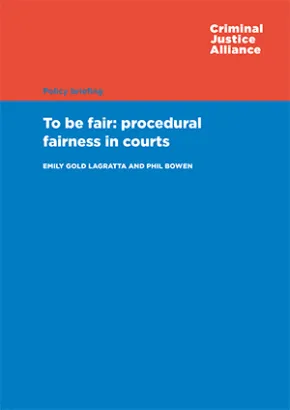When courts act with fairness, people are more likely to respect the law. But it is not enough for courts to simply act impartially: they must be seen to be fair. And, counter-intuitively, research has shown that being seen to be fair is less about the decisions that courts take and more about the way that they take them.
Experts often refer to this as “procedural fairness” – the fairness of the court’s procedures and practices. Their research has shown that if courts are respectful, neutral, easy to understand and give people involved in the case have a voice, they can build trust in the law. It is this trust which causes people to comply with court orders, to co-operate with the police and ultimately to obey the law.
This report, sets out why procedural fairness matters for courts, explains the factors which affect whether people feel fairly treated and puts forward some practical ideas on what courts can do about to improve it. It is intended as a practical resource for people working in courts, as well as a guide to research in this area.
Improving procedural fairness doesn’t have to be complicated: Simple, often unnoticed, practices such as making eye contact and addressing defendants by name can go a long way toward making people feel fairly treated. But by focussing on the experience of members of the public caught up in the justice system – whether as defendants, victims or witnesses – courts can make a real difference to public trust in the law.
What does procedural fairness mean for courts?
Researchers have identified four things which contribute to members of the public feeling fairly treated:
- Whether they understand what takes place in court and what the court’s decisions mean for them. Professionals working in court can help people’s understanding by avoiding jargon and taking the time to explain complex processes
- Whether they are treated with dignity and respect. Courts staff and the judiciary can demonstrate respect through simple gestures like greeting people by name and making eye contact.
- Whether they perceive that courts takes decisions in a way that is neutral and unbiased. Courts appear neutral if they explain the reasoning behind decisions and ensure that courts staff are not too friendly with prosecutors or deferential to police officers.
- Whether they have a voice in the criminal justice process. Courts can contribute to this by making good use of victim impact statements and offering defendants an opportunity to directly address the court at appropriate points.
Why does procedural fairness matter?
Every day many of us are presented with opportunities to break the law. Research has shown that the most important reason that most of us choose to abide by the law is not because we are afraid of getting caught, or even because we agree that the laws are right. Rather, we obey the law because we believe that obeying the law is the right thing to do. But this belief in the law is undermined if we perceive that the justice system itself acts in ways that are unfair or unjust.
Procedural fairness, therefore, is important because when the justice system acts fairly it makes people more likely to obey the law and co-operate with law enforcement. Research has shown that if people feel they have been treated fairly, they are more likely to believe that the courts have a moral right to make decisions on disputed matters, and consequently, they are more likely to obey those decisions. First-hand experience of procedural justice has been shown to increase people’s belief in the legitimacy of the judicial system and make them more likely to obey the law in the future.
